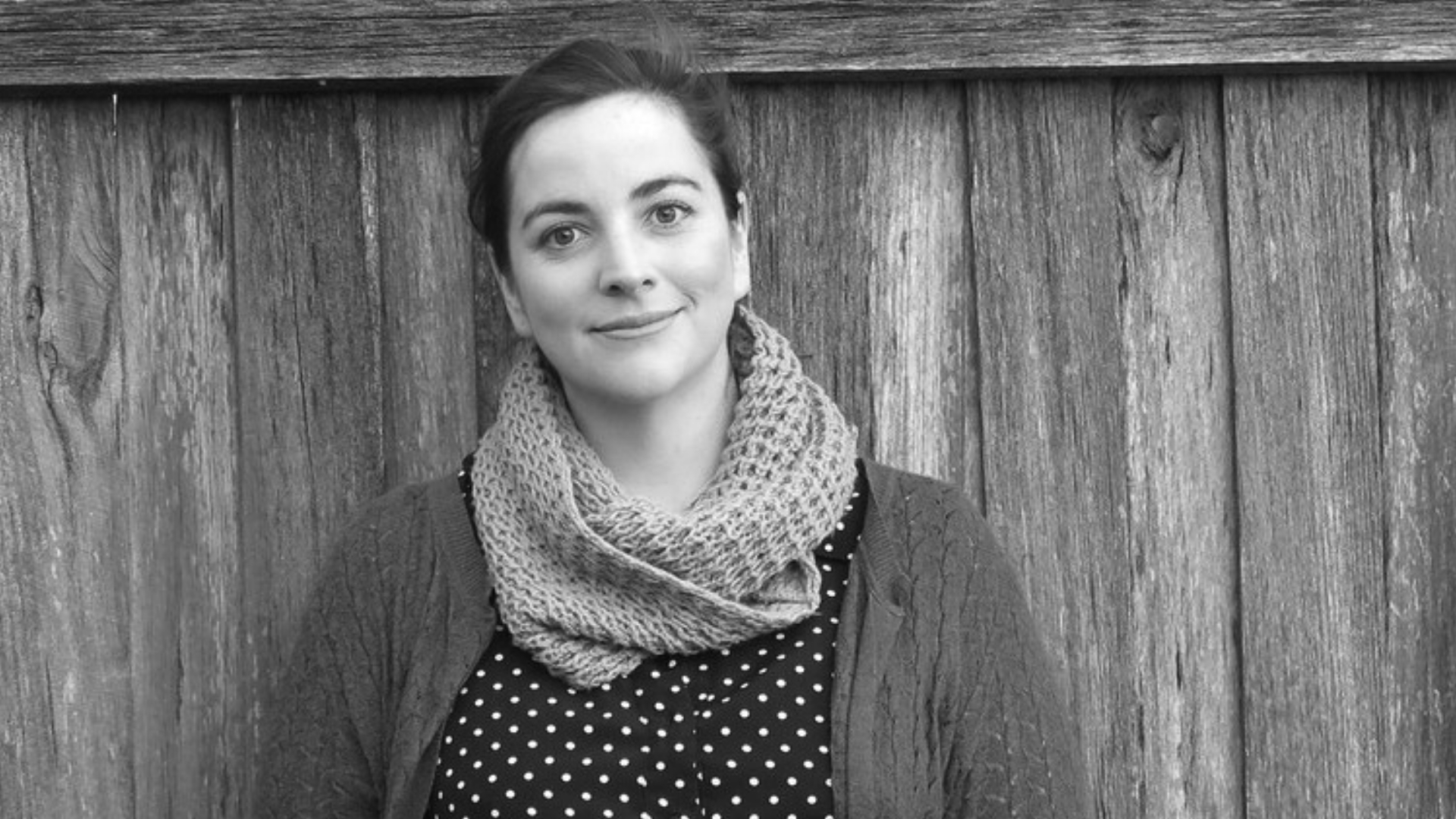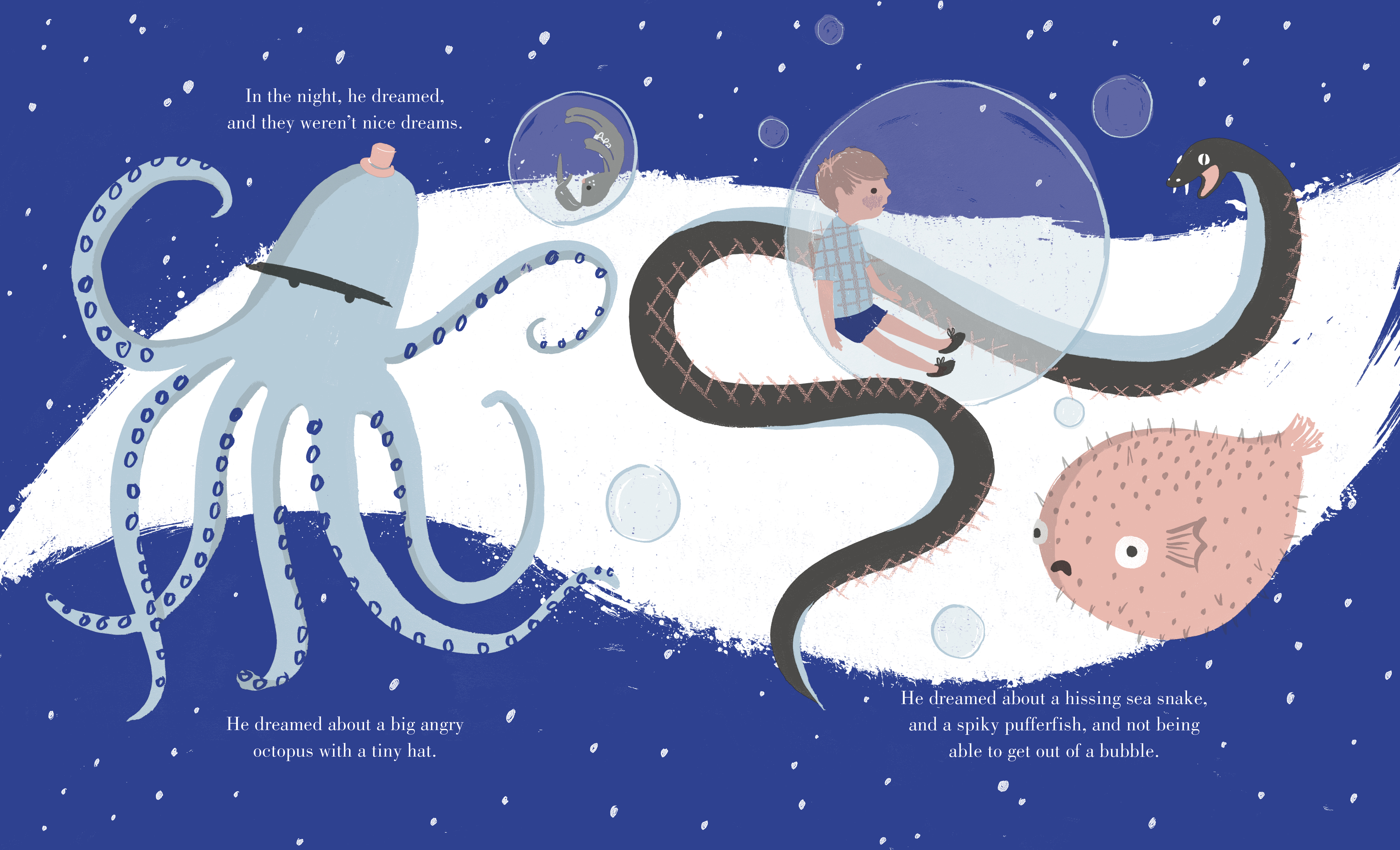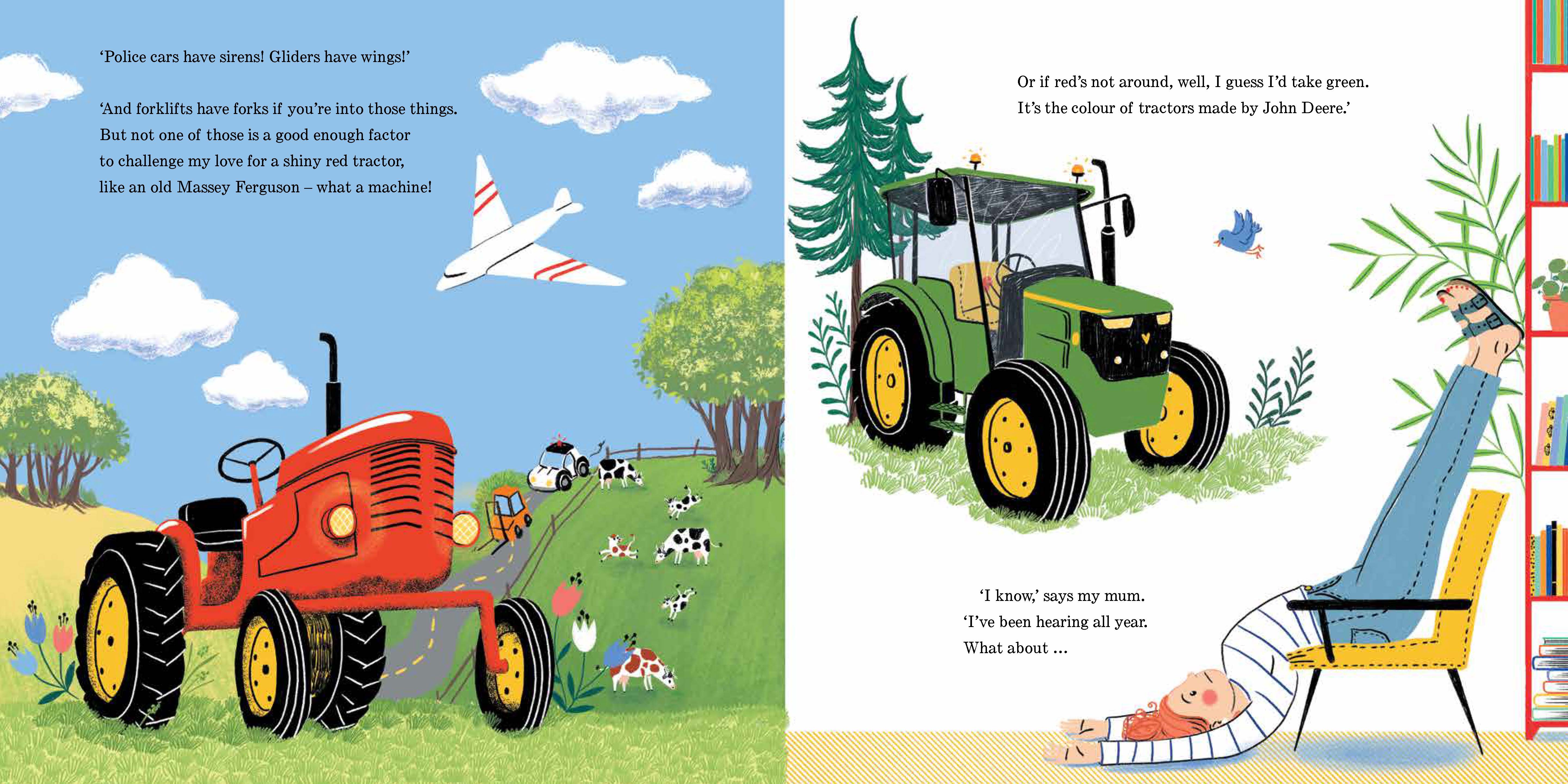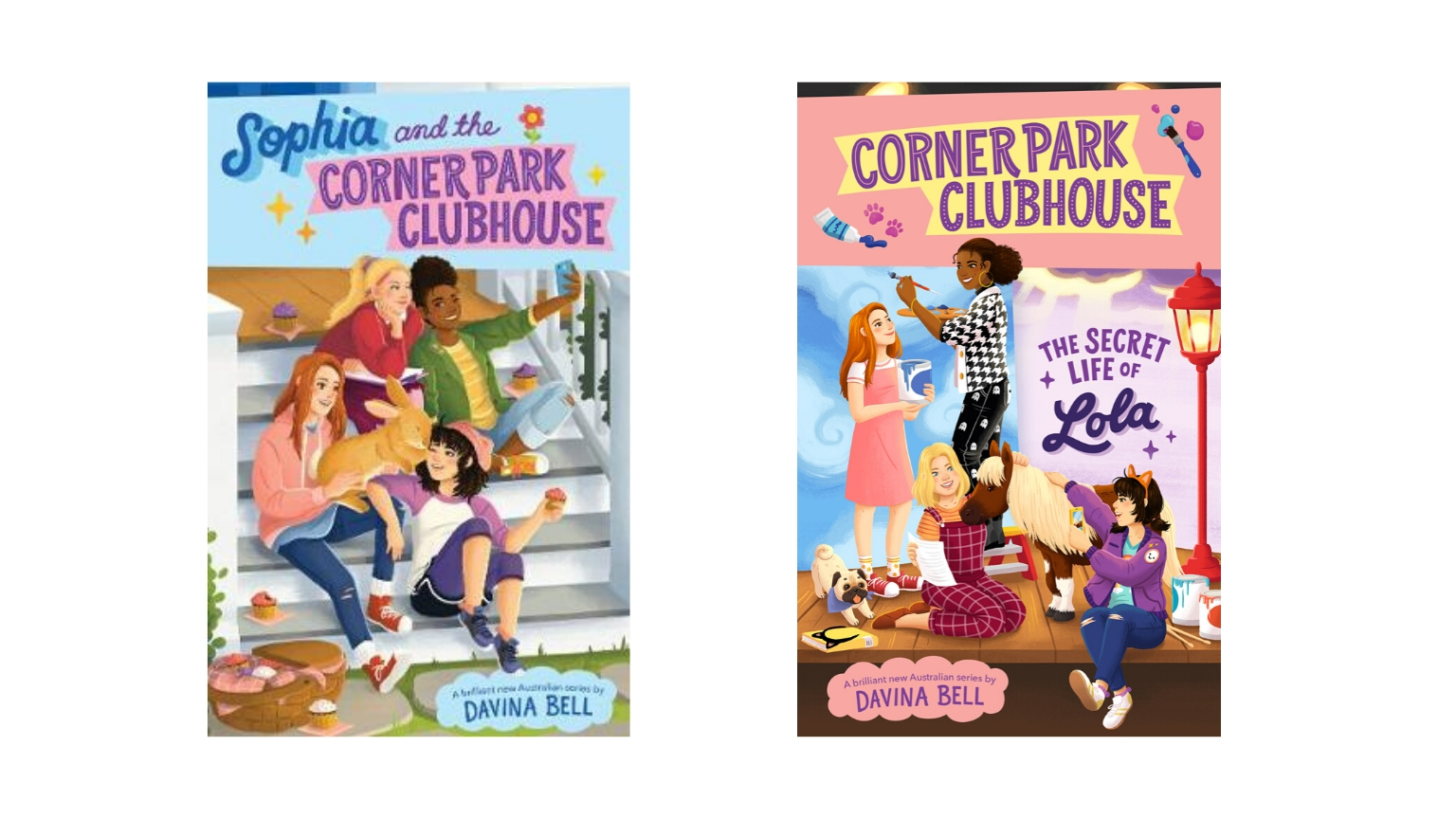Australian author and editor Davina Bell is an exceptional storyteller for kids aged 2 to 12. Her broad range of books include picture books like Under the Love Umbrella (Scribble) and her most recent All of the Factors of Why I Love Tractors (Hardie Grant), early reader series Lemonade Jones (Allen & Unwin), historical junior fiction ballet series The Alice Stories (Penguin), and absolutely wonderful middle grade fiction in the guise of the Corner Park Clubhouse series (Hardie Grant).

Davina studied Professional Writing and Editing as a post-graduate student. Around the time she began as an editor at Penguin, she had a couple of short stories for adults published. When her publisher Jane Godwin read them, she asked if Davina had considered writing for children.
‘At the same time, I was learning so much about craft from the writers I was working with, and was also reliving the immense joy that childhood reading had given me. I could see so plainly how books have the power to shape the humans we want to be. So I think it was the belief that Jane kindled in me and the desire to do something good for the world that inspired me to start – and continue to inspire me to this day.’
Davina’s books are remarkable for their compassion and emotional complexity. Her child protagonists are human and real. The Underwater Fancy-Dress Parade, about a socially anxious boy, was inspired by her own lifetime of anxiety. She says, ‘I was a child who hated dressing up and a teenager who hated parties. I’m an adult who sometimes feels stressed-out by cocktail do’s where everyone else seems to be having a marvellous time. For a long while, social anxiety was a huge part of my life, and it wasn’t until I read Quiet, by Susan Cain that I realised how normal and yet how under-acknowledged the struggles of introverts are.

‘So I wrote this for kids who might see themselves in Alfie – the boy who’s just too overwhelmed to dress up as Captain Starfish in the Underwater Fancy-dress Parade. I wanted to say to them: it doesn’t matter if you can’t overcome your fear in a particular moment or situation. It’s how you think about yourself afterwards that matter, and when the time is right, you will be braver than you know. Anxious people have such a strong self-critical voice. I wanted to give anxious kids the comfort and acceptance that I wish I had for myself, which comes out in the actions of the parents.’
In the book Alfie doesn’t overcome his fear, and neither is he required to by his parents. They make sure he feels loved, no matter what.
When Davina Bell has an idea for a picture book, it bursts into her head almost fully-formed. ‘I wish I could say I had a process, but really, the stories find me. Whether or not they rhyme is not within my control – it’s dictated by how I hear them.
‘I wish I could say I had a process, but really, the stories find me. Whether or not they rhyme is not within my control – it’s dictated by how I hear them.’
‘It sounds strange, I know, but I truly believe that I am just a conduit for the words that come through me in the months and often years after I’ve had a particular thought or heard a phrase or made an observation that resonates in my heart. It’s not like this for my longer-form stuff, but picture-book texts feel like gifts that are given to me from another force, another world.’
Her three picture books with Scribble – as well as The Underwater Fancy-Dress Parade, and Under the Love Umbrella, she has All the Ways to be Smart – are all illustrated by Alison Colpoys, whom she met at Penguin where they were keen beans working into the night, with Alison working as a designer. ‘We started to share lifts home together, and that’s when we discovered that she had always dreamed of illustrating a picture book and I had always dreamed of writing one,’ says Davina.
‘We were never paired together on projects at Penguin, so we created our own – a proposal to re-imagine the Penguin Australian Children’s Classics. We so loved working together on those ten books – which featured Allison’s beautiful cover illustrations – that we decided to create a picture-book proposal together. The rest is history. Looking back, I can’t believe how lucky we were to meet and how fortunate we are to still be creating together in a really collaborative process. We brainstorm all the images together and meet up regularly to workshop. Increasingly, Ali helps me with the text, too. It feels like our partnership is always evolving and growing stronger.’
Her most recent picture book, All of the Factors of Why I Love Tractors (Hardie Grant), illustrated by Jenny Lovlie, includes one of my favourite illustrations of recent years, that of a mum so bored by her son’s obsession with that one book about tractors that she is hanging upside down on a chair in the library. I was delighted to hear it was Davina’s favourite spread too.

Her childhood obsession was books. ‘I was incredibly lucky that this was encouraged and celebrated in my house.’ She learned a lot of tractor anatomy writing the tractor book, and says, ‘I found myself very impressed by their versatility – so many possible attachments and uses! And the shapes of some of the vintage tractors are just exquisite. I also hadn’t realised what a divide there is among loyalists to Massey Fergusons (red) and John Deeres (green). It’s a contentious issue!’
Next, let me tell you about the Corner Park Clubhouse series. It brings the sensibility of the girl group-centred books of the early 90’s to modern concerns, with more emotional complexity. There is a Trumpian character in the first one who is a fantastic pastiche. There are crushes, emotional highs and lows, and utter, devastating loss.
It is like smashing The Babysitter’s Club with The Gymnasts, but with modern concerns and more emotional complexity.
The first book is written in the voice of Sophia (the one who keeps everybody together), the second in the voice of Lola (the artistic one). The other two girls in the friend group are Maisie (the gymnast with tricky parents), and Belle (the organised one). As you begin reading, you know quickly that Sophia is missing Gracie, but it isn’t until a few chapters in you find out who Gracie was and why she is missing her.
Many of Sophia’s memories with Gracie include the clubhouse, so she and her friends throw themselves into the project of a lifetime. This is my new favourite middle fiction series, hands down. Davina was inspired by her love of Ann M Martin’s The Babysitters Club, and The Gymnasts, by Elizabeth Levy. ‘I loved reading any books that explored the dynamics between the different members of a girl gang – the magnetism and tension of their personalities, and how each one had a role. I liked thinking about how the different combinations of those characters fed into different kinds of storylines, and how I could see myself clearly in a member of the gang – usually the studious brunette.
‘I was an incredibly voracious reader as a kid, and I wanted to recreate that hunger for young readers today – the feeling that you just can’t physically wait to read the next adventure in a series, and the next; that you’re living in the world, that the characters are your friends too.’
It can be difficult for authors to tackle such tough topics for such a young audience, but Davina has succeeded beautifully. Here is a quote from the book: ‘I don’t just miss Gracie. I am the missing. Like the ocean is blue. It’s as if I’ve turned into something entirely different – a whole other creature, like a mermaid. And part of the missing is missing the old me. I thought the old me might be at the clubhouse, waiting. But now there might not be a clubhouse, and I don’t know how many more things I can lose.’

Davina says, ‘My publisher did question me at one point as to whether I really wanted to explore this issue. It has the potential to cast such a long shadow. But Gracie, the sister who has passed away in the Corner Park books, was the reason I started the series.
‘I saw a post on Instagram account Humans of New York that featured a girl called Grace with incredibly curly black hair and fantastic glasses. As soon as I saw her face, I knew I wanted to write about her – and that was before I read her inspiring narrative in the captions. She was a childhood cancer survivor and baseball enthusiast who lived in a small town, where she was known by everyone and much loved.
‘Immediately the author part of my brain started asking, ‘What if? What if she hadn’t survived? What if you were the twin sister of this incredibly smart, loved kid around town who was left behind when she died?
‘To reduce the possibility of the book becoming too negative for my audience, I added in lots of different elements to soften and lighten the narrative, and that’s why I’ve used lots of puns and a pug on a skateboard and larger-than-life characters and moments of humour and inspiring quotes. I also tried to write in a quite restrained way – to allow the character of Sophia, Gracie’s sister, some privacy in her grief, and for the gaps and silences to tell Gracie’s story.
‘To reduce the possibility of the book becoming too negative for my audience, I added in lots of different elements to soften and lighten the narrative, and that’s why I’ve used lots of puns and a pug on a skateboard and larger-than-life characters’
‘I feel as if I wanted to provide young readers with an alternative to the many humour-led books that are out there today. They are great too, and have their place, but I believe that children are capable of exploring big ideas in fiction and hunger to be taken seriously as readers.’
Unlike her picture books, which are driven by voice and tone, Davina’s middle fiction books are very deliberately planned out. In the case of the Corner Park Clubhouse series, she began with the characters and the setting, a perfect suburb called Sunnystream.
‘I began by making mood boards of the characters – what they looked like, what they’d wear, who was in their families, what their homes and their inner worlds were like, their hobbies and gifts and flaws. I based them on the four personality types of Gretchen Rubin’s Four Tendencies paradigm, which looks at the intrinsic and extrinsic motivators that people respond to ‒ as well as on the traits of me and my three best friends. Whenever I came to a place in the plot where I was stuck, I would re-visit their motivations as outlined in Gretchen’s quiz, and that would give me the key to how each one would respond to the particular situation or moment of conflict and tension.
”Then I really took time to map out their suburb, Sunnystream, in my mind until I could see each corner and storefront and patch of the park. I started writing at the end of 2016, just before Trump got elected, and soon the world of the books became an extension of my longing for the world around me to be a safer, warmer, kinder place – contained and almost old-fashioned in how people know and care for each other.’
‘I started writing at the end of 2016… soon the world of the books became an extension of my longing for the world around me to be a safer, warmer, kinder place – contained and almost old-fashioned in how people know and care for each other.’
Like with Gretchen Rubin’s Four Tendencies, you can take a quiz to find out which character you are from the Corner Park Clubhouse series on Davina Bell’s Instagram. ‘I have people coming up to me identifying with my characters at schools, and asking me which one I am. It’s one of my favourite parts of being a writer. I tell them that I’m mostly a Sophia (sensitive, a bit passive, kind of dreamy) but I wish I were a Lola (creative, brazen, bold and expressive). I’ve done my quiz many times but I’m always a Sophia. I guess there’s always a part of us that wishes we were different.’
Here’s my advice. If you are a bookshop, stock Davina’s books. If you are a library, get them in. If you are a parent, see which ones will suit your kids. She has a YA book coming out in 2020, to complete her takeover of the Australian children’s writing scene.

Sarah Forster has worked in the New Zealand book industry for 15 years, in roles promoting Aotearoa’s best authors and books. She has a Diploma in Publishing from Whitireia Polytechnic, and a BA (Hons) in History and Philosophy from the University of Otago. She was born in Winton, grew up in Westport, and lives in Wellington. She was a judge of the New Zealand Book Awards for Children and Young Adults in 2017. Her day job is as a Senior Communications Advisor—Content for Te Herenga Waka—Victoria University of Wellington.



